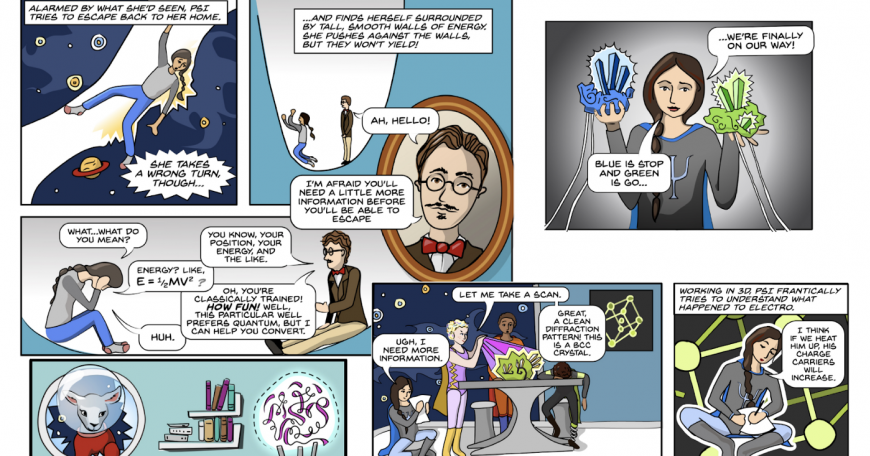
“See You in the Funny Papers”: Do educational comics affect MOOC student performance and attitudes?
Once considered the antithesis of substantive educational content, comics and comic book graphics have found their way into the mainstream of teaching and learning. From the academic meta-commentary of PHD (Piled Higher and Deeper) Comics to Prince of Cats, the YA hip-hop infused companion to Shakespeare’s Romeo and Juliet, comic strips are an increasingly prevalent means of disseminating ideas and starting discussions in educational settings. But can comics actually help you learn more effectively?
That’s the question MITx Digital Learning Lab Scientist Dr. Jessica Sandland, along with colleagues at MIT, explored in “Electronic, Optical, and Magnetic Properties of Materials: A Comic-Based MOOC,” the winner of one of two Best Paper Awards at the seventh annual international Learning with MOOCs Conference. Organized by the IEEE Education Society, the conference serves as an opportunity for online learning experts and practitioners to discuss research into the technology surrounding Massive Open Online Courses (MOOCs) as well as the practical aspects of creating and disseminating these courses to a global audience.
This year’s theme, “The 4th Industrial Revolution: Challenges and Opportunities,” focused on “spreading the MOOC movement” by encouraging growth in digital learning and learning through technology in new and underserved institutions, as well as enhancing diversity and inclusion in the global workforce.
Led by Sandland and Polina Anikeeva, associate professor in the Department of Materials Science and Engineering, the MIT award-winning team delved into efforts at better engaging online learning audiences through the use of comic book visuals. Using a sophomore-level MIT Department of Materials Science and Engineering core course, “Electronic, Optical and Magnetic Properties of Materials” as their primary case in point, the team studied the effect of adding comic strips to online materials used in the course’s on campus version, and in its 16 week-long MOOC form, first offered on MITx in Spring 2018.
Working with materials scientist and comic designer Emma Vargo ’19 and graphic artist Jane Holland, the team incorporated richly illustrated comic panels to set up the course’s online problem sets, key not only to a better understanding of the subject matter, but also to ensuring that students have the requisite skills to complete design projects. The research team hypothesized that the comics, set in a world of superheroes and allegorical representations of scientific concepts, might provide a more engaging and effective way for students to absorb information than in the traditional text-only format.
The results of the study might be encouraging to educators who are reluctant to experiment with subject-specific humor in the classroom: while the majority of both residential students and MOOC learners enjoyed the comics as entertainment, there was no significant relationship between the presence of the comics and the learners’ performance on problem sets. Moreover, even as entertainment, the comic strips seemed to resonate only with the residential student audience; learners on edX, on the other hand, strongly preferred their material to be presented without comic embellishment.
Sandland believes that the on-campus students’ reactions to the comics are likely indicative of Institute culture, rather than a difference between online and in-person learning experiences. “The MIT students are demographically quite different from our MOOC learners, and their relationship with the Institute and with the teaching staff is very different, too,” she says. “Our MIT students benefit from a strong relationship with Prof. Anikeeva and her teaching staff, and they exist within MIT’s unique campus culture where comics and superheroes are frequently enjoyed, and so it’s not surprising that they responded enthusiastically to the comic strips.”
These findings underline the idea that in education, there is no such thing as a one-size-fits-all approach. Says Sandland, “This disparity between the two groups emphasizes for me the idea that an educational approach that works well for one group of learners won’t necessarily work well for a different and distinct group of learners.”
---
MIT’s Digital Learning Lab (DLL) is a community of academics working across departments, who are responsible for MOOC development, hybrid learning initiatives, and research related to these projects. All DLL Fellows hold advanced degrees in their field of specialization, and focus all or most of their time on digital learning projects, working in conjunction with MITx and the Office of Digital Learning’s Residential Education branch to continually refine and set best practices for online learning.

